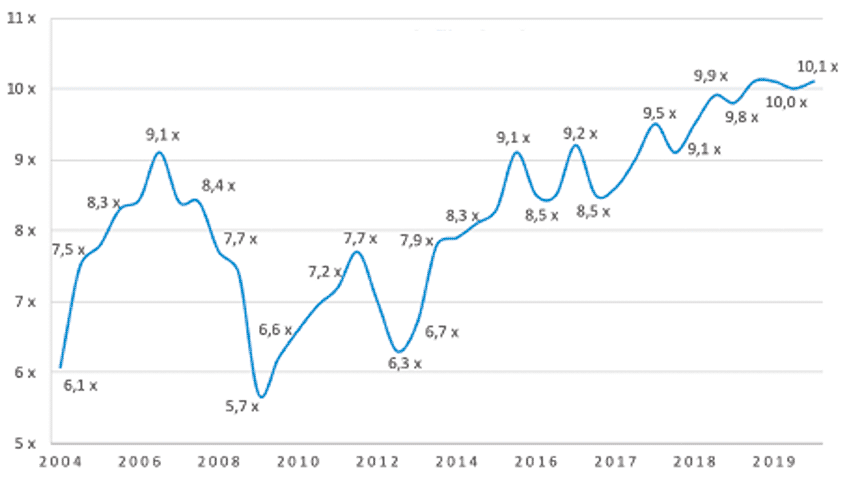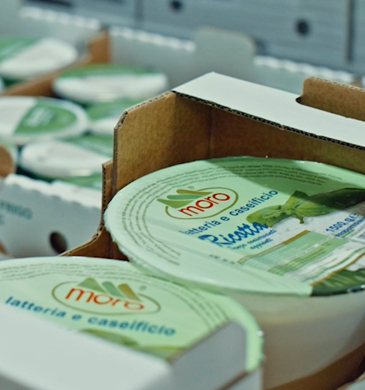- De overnameprijs voor Europese niet-beursgenoteerde mkb’s bereikt met 10,1 x EBITDA opnieuw zijn hoogste peil ooit.
- De fusie- en overnameactiviteit in Europa neemt verder af doordat institutionele verkopers zich massaal terugtrekken.
Parijs (Frankrijk) – 15 november 2019 – Argos Wityu, een onafhankelijk Europees investeringsfonds, en Epsilon Research, een online platform voor fusie- en overnametransacties van niet-beursgenoteerde ondernemingen, publiceren vandaag de Argos Mid-Market Index® over het derde kwartaal van 2019. Sinds 2006 meet deze index de waardering van niet-beursgenoteerde mkb’s uit de eurozone waarin tijdens de afgelopen zes maanden een meerderheidsbelang werd genomen.
De overnameprijs voor Europese niet-beursgenoteerde mkb’s bereikt met 10,1x EBITDA opnieuw zijn hoogste peil ooit.

Mediane EV/EBITDA-verhouding over een voortschrijdende periode van zes maanden Bron: Argos Mid-Market Index®/Epsilon Research
Achter die stabiliteit gaan echter twee verschillen schuil:
• De blijvende kloof tussen de waarderingen die industriële kopers betalen, die dit kwartaal stijgen tot 11,0 x EBITDA, en de prijzen die private-equityfondsen op tafel leggen, die nagenoeg stabiel blijven op 9,6 x EBITDA.
• De beurswaardering van beursgenoteerde middelgrote bedrijven uit de eurozone bedraagt 8,4 x EBITDA, 30% minder dan de overnameprijs voor niet-beursgenoteerde middelgrote bedrijven uit de eurozone van 11,0 x EBITDA. Bij overnames door private-equityfondsen is dat verschil minder groot.
De fusie- en overnameactiviteit in Europa neemt verder af doordat institutionele verkopers zich massaal terugtrekken
De begin 2019 ingezette neergang van de fusie- en overnamemarkt (in volume) zet zich door met een waardedaling van 11% wereldwijd en 32% in Europa. Die tendens is ook merkbaar in de fusie- en overnameactiviteit in het middensegment in de eurozone, die ten opzichte van het tweede kwartaal in het derde kwartaal van 2019 afnam met 26% in volume en met 34% in waarde.
Terwijl het verkoopvolume door private-equityfondsen al verschillende jaren stabiel blijft, verkopen institutionele spelers sinds 2018 steeds minder dochterondernemingen. Die achteruitgang is in het derde kwartaal van 2019 nog versneld. De verkoop van dochterondernemingen, vroeger de voornaamste bron van niet-beursgenoteerde transacties, is nog slechts goed voor 30% van de markt. Die verschraling verklaart deels het slinkende volume op een voorts actieve markt.
Argos Wityu
Coralie Cornet
Directeur Communicatie
ccc@argos.fund
+33 6 14 38 33 37
Argos Wityu (www.argos.wityu.fund) is een zelfstandig Europees investeringsfonds dat de overdracht van bedrijven begeleidt. Het fonds heeft inmiddels meer dan 80 ondernemers begeleid en richt zijn investeringsstrategie op complexe transacties, met een voorkeur voor reorganisatie en groei en nauwe betrokkenheid bij de managementteams. Argos Wityu geeft de voorkeur aan meerderheidsdeelnames en investeert per transactie 10 tot 100 miljoen euro. Argos Wityu heeft ruim een miljard euro in beheer, 30 jaar ervaring, en vestigingen in Brussel, Frankfurt, Genève, Luxemburg, Milaan en Parijs.
Epsilon Research heeft het eerste online platform voor professionals ontwikkeld voor het beheer van fusies en overnames van niet-beursgenoteerde bedrijven. Het platform bevat gegevens, analyseverslagen, softwaretools en diensten die onmisbaar zijn voor private equity-beoordelen en beheren van investeringen in niet-beursgenoteerde bedrijven: EMAT, de eerste databank met de ratio’s van private equity-transacties in Europa, bevat analyseverslagen van ruim 8.000 fusies en overnames met een waarde van 1 miljoen tot 500 miljoen euro in alle sectoren. Daarnaast regelmatig gepubliceerde indexen en onderzoeken, waaronder de Argos Index®) en cloud-software voor het beheer van contactpersonen en projecten met betrekking tot fusies en overnames, en waarderingen van vergelijkbare investeringen in private-equityfondsen.
De Mid-market Argos Index® meet de ontwikkeling van de waardering van niet-beursgenoteerde kleine en middelgrote bedrijven in de eurozone. De index wordt elk kwartaal berekend en gepubliceerd door Argos Wityu en Epsilon Research en is de mediaan van de historische EV/EBITDA-ratio over een voortschrijdende periode van zes maanden van transacties die aan de volgende voorwaarden voldoen: mid-market (totale waarde van de effecten tussen 15 en 500 miljoen euro); overnamedoelwit gevestigd in een land van de eurozone; meerderheidsbelang; uitsluiting van bepaalde activiteiten (financiële diensten, vastgoed en hightech).











